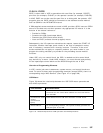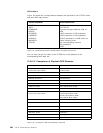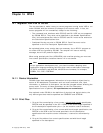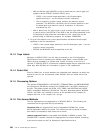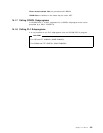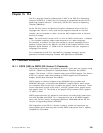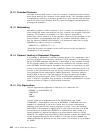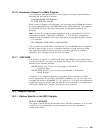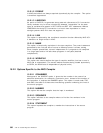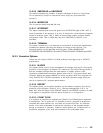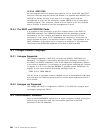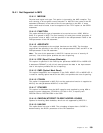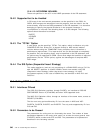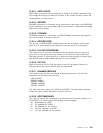15.1.2 Extended Precision
Available with the MVS version of the PL/I compiler, extended precision floating
point allows working with variables of two double-words. This extended precision
is requested by specifying a precision greater than 16 for decimal float variables
and 53 for binary float variables. DOS PL/I does not support extended precision
floating point arithmetic.
15.1.3 Multitasking
Multitasking support in MVS introduces in PL/I a number of new statements. It is
worth noting that these new functions are only invoked if the program calls them
explicitly. For example, it is possible in a CALL macro to associate an
EVENT-type control variable. It is then possible, at the end of the program, to test
the termination of the associated task with a procedure invoked by a WAIT or
with the function COMPLETION. Similarly, it is possible to modify with a single
statement the relative priority of a sub-task:
PRIORITY(T1) = PRIORITY(TI) + 2;
These new functions are additions to the DOS version and do not affect the
compatibility of the compilers.
15.1.4 Dynamic Loading of Dependent Programs
It is possible to dynamically load sub-programs written in PL/I separately from a
main PL/I program. This is done by using the FETCH statement. This statement,
as the RELEASE statement with which it is associated, is only available on MVS.
FETCH causes loading of a LOAD module from LINKLIB or an execution library,
while RELEASE frees the space occupied by the module. It is necessary to pass
control to the sub-program by a CALL statement. Certain restrictions exist in its
use due to the fact that there must not be any external references between the
main program and the sub-program loaded dynamically. Particular attention
must be paid to the use in the sub-program of files and controlled variables
declared in the main program. Since FETCH and RELEASE statements do not
occur in DOS PL/I programs, their presence in the MVS implementation is purely
additive and has no impact on DOS-to-MVS conversion.
15.1.5 File Organization
The file organizations supported in DOS by the PL/I Optimizer are:
REGIONAL (1) and REGIONAL (3)
CONSECUTIVE
VSAM
INDEXED
In MVS, these are all supported and so are REGIONAL(2) and TCAM
(TRANSIENT). A new feature in the use of REGIONAL or INDEXED files is the
capability of requesting a lock at the record level to control simultaneous
updating of the same file by several programs or tasks. This is the attribute
EXCLUSIVE. If this attribute is applied to a PL/I file, then at the time of a READ,
the record will be locked until a REWRITE or UNLOCK has been issued. It is
equally possible to request the reading of a record without locking it: READ
NOLOCK. This support uses the ENQ and DEQ facilities of MVS, and implies that
all the programs sharing the file be written in PL/I such that the RNAME and
QNAE generated are identical for the same record. This function is not available
for VSAM.
334 VSE to OS/390 Migration Workbook




